Chaobo Sun
Dialog-to-Actions: Building Task-Oriented Dialogue System via Action-Level Generation
Apr 03, 2023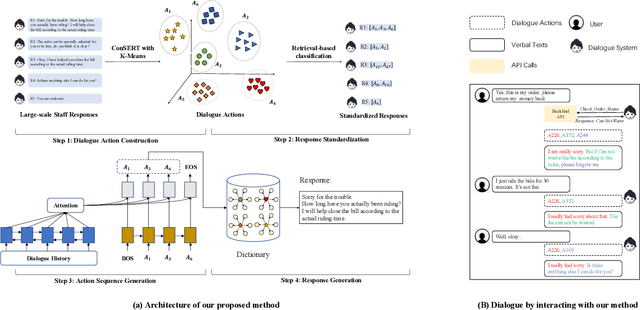
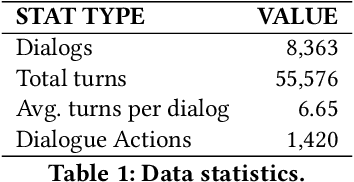
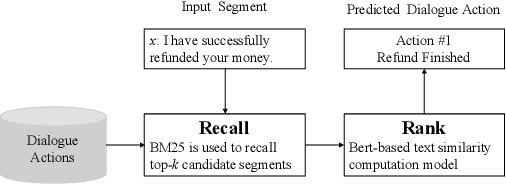
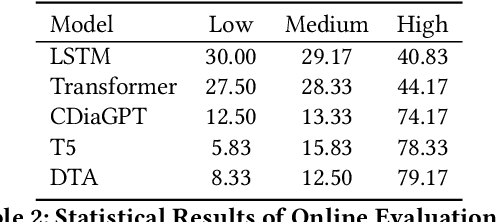
Abstract:End-to-end generation-based approaches have been investigated and applied in task-oriented dialogue systems. However, in industrial scenarios, existing methods face the bottlenecks of controllability (e.g., domain-inconsistent responses, repetition problem, etc) and efficiency (e.g., long computation time, etc). In this paper, we propose a task-oriented dialogue system via action-level generation. Specifically, we first construct dialogue actions from large-scale dialogues and represent each natural language (NL) response as a sequence of dialogue actions. Further, we train a Sequence-to-Sequence model which takes the dialogue history as input and outputs sequence of dialogue actions. The generated dialogue actions are transformed into verbal responses. Experimental results show that our light-weighted method achieves competitive performance, and has the advantage of controllability and efficiency.
Semi-Supervised Knowledge-Grounded Pre-training for Task-Oriented Dialog Systems
Oct 17, 2022



Abstract:Recent advances in neural approaches greatly improve task-oriented dialogue (TOD) systems which assist users to accomplish their goals. However, such systems rely on costly manually labeled dialogs which are not available in practical scenarios. In this paper, we present our models for Track 2 of the SereTOD 2022 challenge, which is the first challenge of building semi-supervised and reinforced TOD systems on a large-scale real-world Chinese TOD dataset MobileCS. We build a knowledge-grounded dialog model to formulate dialog history and local KB as input and predict the system response. And we perform semi-supervised pre-training both on the labeled and unlabeled data. Our system achieves the first place both in the automatic evaluation and human interaction, especially with higher BLEU (+7.64) and Success (+13.6\%) than the second place.
Unified Knowledge Prompt Pre-training for Customer Service Dialogues
Aug 31, 2022



Abstract:Dialogue bots have been widely applied in customer service scenarios to provide timely and user-friendly experience. These bots must classify the appropriate domain of a dialogue, understand the intent of users, and generate proper responses. Existing dialogue pre-training models are designed only for several dialogue tasks and ignore weakly-supervised expert knowledge in customer service dialogues. In this paper, we propose a novel unified knowledge prompt pre-training framework, UFA (\textbf{U}nified Model \textbf{F}or \textbf{A}ll Tasks), for customer service dialogues. We formulate all the tasks of customer service dialogues as a unified text-to-text generation task and introduce a knowledge-driven prompt strategy to jointly learn from a mixture of distinct dialogue tasks. We pre-train UFA on a large-scale Chinese customer service corpus collected from practical scenarios and get significant improvements on both natural language understanding (NLU) and natural language generation (NLG) benchmarks.
A Low-Cost, Controllable and Interpretable Task-Oriented Chatbot: With Real-World After-Sale Services as Example
May 13, 2022

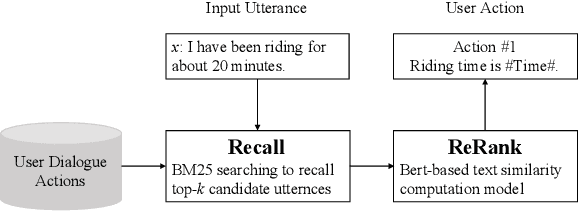

Abstract:Though widely used in industry, traditional task-oriented dialogue systems suffer from three bottlenecks: (i) difficult ontology construction (e.g., intents and slots); (ii) poor controllability and interpretability; (iii) annotation-hungry. In this paper, we propose to represent utterance with a simpler concept named Dialogue Action, upon which we construct a tree-structured TaskFlow and further build task-oriented chatbot with TaskFlow as core component. A framework is presented to automatically construct TaskFlow from large-scale dialogues and deploy online. Our experiments on real-world after-sale customer services show TaskFlow can satisfy the major needs, as well as reduce the developer burden effectively.
 Add to Chrome
Add to Chrome Add to Firefox
Add to Firefox Add to Edge
Add to Edge